open to interpretation
As I browse through The Annotated Emma, Jane Austen’s novel annotated and edited by David M. Shepard, I pause longer than usual over his Notes to the Reader, where he signals plot disclosures and literary interpretations. He explains that Austen “developed … with great skill” several “mysteries … crucial to the story”, and I lean in to listen more carefully, because I have settled on this novel for an upcoming high school English course. Then I come to a complete halt, since I need to see him face to face as he tells me this: “Comments on the techniques and themes of the novel … represent the personal views and interpretations of the editor.” I realize that such a disclosure may be one of the most helpful aspects of my own instruction that I can offer to my students.
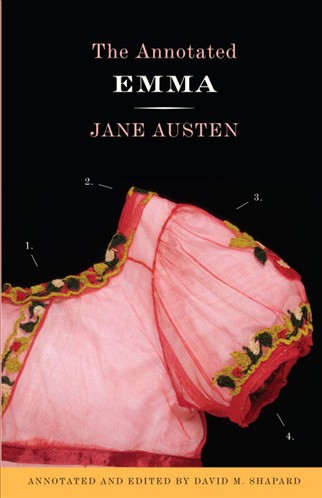
open to question
I have mentioned elsewhere how as a sophomore I asked my own teacher “How do you know?” What I was really wondering was, “What tools can I use myself to construct meaning, notice an author’s craft, or spy a symbol embedded in a landscape of detail?” I may have been curious about how much of what had been placed before us was open to question. As I design my course, it may be beneficial to students if I publish similar disclosures at the outset. I appreciate the way Shepard expresses himself, stating that while his views will “provoke disagreement”, he hopes that “in such cases the opinions expressed [will] provide useful food for thought”. And I sincerely trust that my students desire to think critically, needing only to be shown both where and how such questioning can be most productive; their questioning demands my openness to disagreements.
out of a job
I am describing a process by which students learn to be resistant readers. A full menu of theory and procedures for care and feeding of confident and resistant readers may be explored in Gordon Pradl’s Literature for Democracy. What I glean from Pradl’s work, including his NCTE session several years ago on a texts’ authority and context, is that authority, whether of a text, a teacher, or an interpretation, must be allowed to withstand scrutiny.
In a classroom, what would it look like for the teacher to invite questions about her, his, or their own interpretive process? When does a young reader become confident enough, feel free enough, to enquire of the instructor or tutor? It happens best when the younger apprentice sees themself supported by the tutor who guides, but who necessarily does not do all the leading.

Photo by Breakingpic on Pexels.com
I have heard it said that teachers hope to become obsolete – once our students think, write, and read independently, there is no longer any need for us. I want to revise this commonplace. There shall always be a need for experienced readers in a community of readers. If we press toward ensuring shared authority of both co-leaders and co-learners in our interpretive communities, anyone might feel not only welcome at the conversation table, but also enfranchised: having a sense that their full participation as members of such a community is worthwhile. The conversation should feel so lively, unplanned, visceral, and thrilling that no one wants to miss the new revelations or discoveries that might happen there.
a shift in control
Where discussions are thought-provoking and texts are inviting, according to Judith A. Langer, students learn literary language, with support of a teacher, from their involvement in “discussions that matter”. The focus of the course must be on readers developing their own changing perspectives and interpretations; she argues that “a shift in control from teacher to student is a necessary first step for the social interactions to shift from recitation and guesswork (What is it the teacher wants?) to substantive thought and discussion that can extend students’ range of understanding.”
Learning to listen to students’ ideas and to base instruction on students’ responses is a difficult shift to make. (99)
What can I do in September this year to make the shift easier for my own students?

Photo by Pixabay on Pexels.com
For one thing, I can take a lesson from Shepard and demystify my own interpretive processes, by being transparent at the outset of year that my own analysis of a book such as Emma is not the content of the class; rather, their own emerging understandings will be. I can focus less on homework and grading policies and be more upfront about shifting toward assessments and feedback designed with student thinking, social contexts, and multiple readings and texts in mind.
trust and voice
I have felt at my most vulnerable before students when sharing my writing with them: writing before them, or reading a poem or homework assignment I have written alongside them. Such openness to criticism was presumably a signal of my trust in them to be respectful of my fragile creations and ego. Yet a stronger and more intentional invitation of their trust in me would be issued by course disclosure of expectations at the outset.
A Star Is Born 2018 Trailer – at smooth.com
You have a voice. The opinions expressed here are open to question, provoking disagreements, providing food for thought. Your thoughts matters. I will support your learning purposes. The texts we explore are avenues down which we walk together. There are also some great stories here. And we will get to know some people; and wherever avenues are explored, we’ll encounter more mysteries – “mysteries crucial” to our stories.
Recommended Reading
Fish, Stanley. Is There a Text in This Class? The Authority of Interpretive Communities. 1980. Harvard University Press.
Langer, Judith A. Envisioning Literature 2011. Teachers College (Second Edition).
Pradl, Gordon. Literature for Democracy Reading as a Social Act. 1996. Boynton/Cook [Heinemann] .
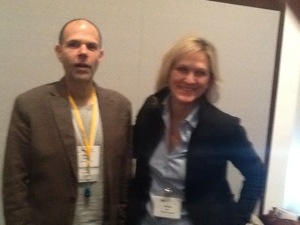

 Enacting Adolescent Literacies across Communities: Latino/a scribes and their rites (2017) offers a hopeful vision where young scribes:
Enacting Adolescent Literacies across Communities: Latino/a scribes and their rites (2017) offers a hopeful vision where young scribes:

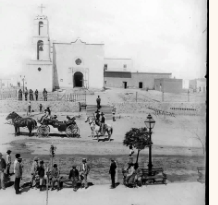



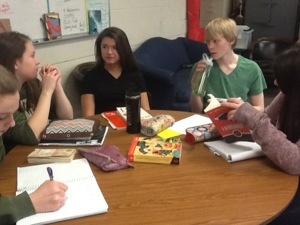
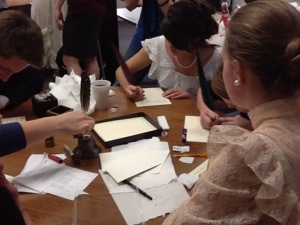
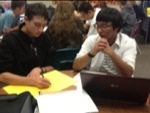
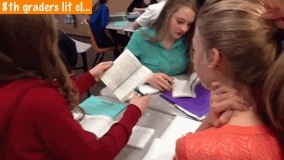
 ed to become the one who emerges a new teacher from the womb of the earth, in order to first equip them to do good work, and then to leave them alone to get it done. I will continue with them from the sidelines, cheering them on. But they need to see that I am not their primary audience, nor are their immediate peers. There is a world outside which they need to become a part of, interact with, commune and communicate with.
ed to become the one who emerges a new teacher from the womb of the earth, in order to first equip them to do good work, and then to leave them alone to get it done. I will continue with them from the sidelines, cheering them on. But they need to see that I am not their primary audience, nor are their immediate peers. There is a world outside which they need to become a part of, interact with, commune and communicate with.